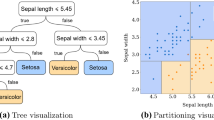Abstract
We explore the problem of learning decision trees using a Bayesian approach, called TREBBLE (TREe Building by Bayesian LE- arning), in which a population of decision trees is generated by constructing trees using probability distributions at each node. Predictions are made either by using Bayesian Model Averaging to combine information from all the trees (TREBBLE-BMA) or by using the single most likely tree (TREBBLE-MAP), depending on what is appropriate for the particular application domain. We show on benchmark data sets that this method is more accurate than the traditional decision tree learning algorithm C4.5 and is as accurate as the Bayesian method SimTree while being much simpler to understand and implement.
In many application domains, such as help-desks and medical diagnoses, a decision tree needs to be learned from a prior tree (provided by an expert) and some (usually small) amount of training data. We show how TREBBLE-MAP can be used to learn a single tree that performs better than using either the prior tree or the training data alone.
This paper is based on work at IBM T.J. Watson Research Center, Hawthorne NY 10532 USA.
Preview
Unable to display preview. Download preview PDF.
Similar content being viewed by others
References
Anderson, J., Kline, P.: A learning system and its psychological implications. In: Proc. of the Sixth International Joint Conference on Artificial Intelligence, pp. 16–21 (1979)
Asuncion, A., Newman, D.: UCI machine learning repository (2007)
Bennett, K.P., Mangasarian, O.L.: Robust linear programming discrimination of two linearly inseparable sets. Optimization Methods and Software 1, 23–34 (1992)
Bohanec, M., Rajkovic, V.: Knowledge acquisition and explanation for multi-attribute decision making. In: Proc. of the 8th Intl. Workshop on Expert Systems and their Applications, pp. 59–78 (1988)
Breiman, L.: Random Forests. Machine Learning 45(1), 5–32 (2001)
Chipman, H.A., George, E.I., McCulloch, R.E.: Bayesian CART Model Search. Journal of the American Statistical Association 93(443), 935–947 (1998)
Denison, D.G., Mallick, B.K., Smith, A.F.: Bayesian CART. Biometrika 85(2), 363–377 (1998)
Duch, W., Adamczak, R., Grabczewski, K., Ishikawa, M., Ueda, H.: Extraction of crisp logical rules using constrained backpropagation networks - comparison of two new approaches. In: Proc. of the European Symposium on Artificial Neural Networks, pp. 109–114 (1997)
Ho, T.K.: Random Decision Forest. In: Proc. of the 3rd Int’l. Conf. on Document Analysis and Recognition, pp. 278–282 (1995)
Kalles, D., Morris, T.: Efficient Incremental Induction of Decision Trees. Machine Learning 24(3), 231–242 (1996)
Quinlan, J.R.: C4.5: Programs for Machine Learning. Morgan Kaufmann Publishers, San Francisco (1993)
Schlimmer, J.C.: Concept acquisition through representational adjustment. PhD thesis (1987)
Shultz, T., Mareschal, D., Schmidt, W.: Modeling cognitive development on balance scale phenomena. Machine Learning 16, 59–88 (1994)
Utgoff, P.E.: Incremental Induction of Decision Trees. Machine Learning 4, 161–186 (1989)
Wu, Y.: Bayesian Tree Models. PhD thesis (2006)
Wu, Y., Tjelmeland, H., West, M.: Bayesian CART: Prior Specification and Posterior Simulation. Journal of Computational and Graphical Statistics 16(1), 44–66 (2007)
Author information
Authors and Affiliations
Editor information
Editors and Affiliations
Rights and permissions
Copyright information
© 2009 Springer-Verlag Berlin Heidelberg
About this paper
Cite this paper
Andronescu, M., Brodie, M. (2009). Decision Tree Learning Using a Bayesian Approach at Each Node. In: Gao, Y., Japkowicz, N. (eds) Advances in Artificial Intelligence. Canadian AI 2009. Lecture Notes in Computer Science(), vol 5549. Springer, Berlin, Heidelberg. https://doi.org/10.1007/978-3-642-01818-3_4
Download citation
DOI: https://doi.org/10.1007/978-3-642-01818-3_4
Publisher Name: Springer, Berlin, Heidelberg
Print ISBN: 978-3-642-01817-6
Online ISBN: 978-3-642-01818-3
eBook Packages: Computer ScienceComputer Science (R0)




